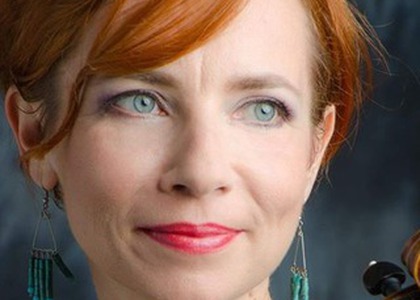> [Archived] Interviews

Interview with the violinist Kovács Emőke, manager of Dinu Lipatti Philharmonic of Satu Mare
The institution has adapted to the situation generated by the pandemic through the broadcast of online concerts on its own Facebook page. About the institution's activity during this period and about the next events of the current season spoke with us the violinist Kovács Emőke, manager of Dinu Lipatti Philharmonic of Satu Mare.
How did "DinuLipatti" Philharmonic of Satu Mare managed to continue its activity until now, within the pandemic context?
We tried to transform the pandemic's disadvantages inthe favor of the philharmonic and of our activities. We managed to invite renowned artists who during this period weren't as busy as before. For example, Horia Andreescu, Tiberiu Soare, Mihnea Ignat, Josu de Solaun from Spania, Răzvan Stoica. The culture is not a whim, but a heritage, it's a fire which needs to be stoked, therefore we are in search of solutions and we have the desire to find them in order to carry on with our activity. Thus, during this period full of restraints and limitations, we resonate between live concerts with 50%, 30% of the hall's capacity, keeping the social distance for the safety of the public as well as of the employees and online concerts.
We have all sorts of small projects with the County Museum of SatuMare, with musical matinee within the museum within which we accompany in the opening act some exhibits. But we also have some projects with the Department of Social Services where we go to family centres and the instrumental artists are performing educative concerts, instrumental exhibitions in order to give a chance to those socially disadvantaged young. We also have partnerships with the churches of Satu Mare, where we performed some kind of tutoring lessons in classical music within church service.
Since March, the institution's concerts have moved to online, where you proposed the audience thematic evenings dedicated to the Italian or American music, and the last event had as protagonists the pianist Szekely Attila and the conductor Ștefan Novak. How do you see the interest in the online organizedevents in comparison with the period when the audience was physically present?
We cannot complain. The interest is considerably great even in the online environment, but as well as literally. We have also sold, since September, season tickets for the music lovers from Satu Mare who with great love and interest are listening to us and who come to our concerts whenever possible. But through the internet we have many view and there is a great interest in our concerts. We have views from people living in Spain, Hungary, Germany, Italy…we really can't complain. It's a great advertisement for us.
What are the plans for the next period? What are the prospects?
We are hoping that, from next week, the number of cases to drop and for April we suggested Russian music. Last week we had Ceaikivski - Concert for piano and orchestra Nr. 1 in B-flat major. This week we are playing From Russia with Love - a chamber recital held by Horia Mihail and Kostyak Elod; on the program Igor Stravinski- Italian suite, Ceaikovsky- Lensky's Aria, Pezzocapricciosso, Prokofiev- Sonata in C major. In April we will also have Ceaikovski's concerto for violin and orchestra, performed by our renowned violinist Răzvan Stoica.
From a personal point of view, do you consider vaccination to be a solution towards the return of the people within the concert halls?
Yes. Throughout history, the vaccine saved many generations. The majority of the members of our orchestra already got the vaccine and we also have a waiting list for vaccination. In conclusion, it can be a solution for the return of people within the concert halls, for a return to normality. I can't wait.
Translated by Băluță Camelia,
University of Bucharest, Faculty of Foreign Languages and Literatures, MTTLC, year I
Corrected by Silvia Petrescu














